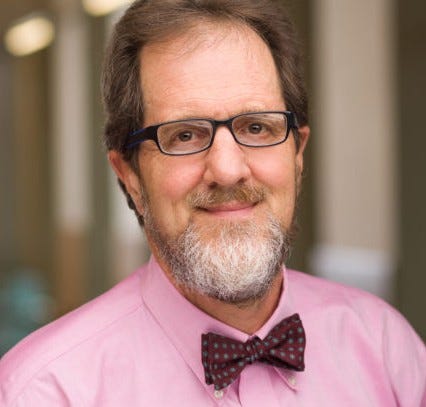Cancer and when to screen
More harm may come from Allopathic over screening for cancers. Over diagnosis and exposure to harmful interventions. Lessens to be learned from a NEJM paper.
With the recent news of an aggressive cancer discovered in a former US President, cancer is once again on TOP OF MIND. That being said cancer screening has been called into questions over the past decade or so.
Given this:
We are not in need of surveillance either by traditional means or by ‘‘liquid biopsy” such as Galleri.
However, caution must be taken as the principles spelled out in “Less Medicine, More Health” apply.
A bit on Dr. Welsch:
Dr. H. Gilbert Welch is an American academic physician and cancer researcher. He was an internist at the Veterans Administration Medical Center in White River Junction, Vermont, as well as a professor of medicine at the Dartmouth Institute for Health Policy and Clinical Practice. In September 2018, Welch resigned from Dartmouth College after a 20-month long research misconduct investigation at Dartmouth concluded he had committed plagiarism.* from Wikipedia
Link to a short video on the principles:
Less Medicine, More Health from Dr. Gilbert Welch short 8 min video.
Less Medicine, More Health: 7 Assumptions That Drive Too Much Medical Care - Gilbert Welch a one-hour lecture on the book.
Link to original article in NEJM
Controversies:
www.statnews.com/2018/09/13/gilbert-welch-resigns-from-dartmouth-over-plagiarism-dispute/
www.statnews.com/2018/09/14/nejm-refuse-retract-gilbert-welch-dartmouth/
The increase in cancer cases in the U.S. can be attributed to a combination of demographic, lifestyle, environmental*, and diagnostic factors. Here are the main causes**:
1. Aging Population
Primary factor: Cancer risk increases with age. Yet recently in the past few years younger people are getting cancer at all time high incidence.
The U.S. population is aging, and since cancer is more common in older adults, more cases are being diagnosed.
2. Lifestyle Factors
Obesity: A major risk factor for several types of cancer, including breast, colon, kidney, and pancreatic.
Diet: Low-fiber, high-fat, and highly processed foods are linked to increased cancer risk.
Alcohol: Regular consumption raises the risk for multiple cancers (e.g., liver, breast, colorectal).
Tobacco use: Still the leading preventable cause of cancer (especially lung cancer), though rates are declining.
Physical inactivity: Sedentary lifestyles contribute to obesity and inflammation, both risk factors.
3. Environmental Exposures
Pollution: Air pollution, industrial chemicals, and water contaminants may contribute. Heavy Metals.
Pesticides and industrial toxins: Some are known or suspected carcinogens. Forever chemicals in our environment and in our food.
Radiation: Including UV radiation (skin cancer) and exposure from medical imaging or other sources.
The possibility of poorly tested vaccines, biologics (mAB) and medication (mRNA shot for example).
4. Infections
HPV: Linked to cervical, anal, and throat cancers.
Hepatitis B and C: Increase liver cancer risk.
H. pylori: Linked to stomach cancer.
Other stealth infections.
5. Increased Screening and Detection
Early detection: More cases are identified due to better and more widespread screening (e.g., mammograms, colonoscopies). Caution overdiagnosis of cancer that will NOT kill but send you to the grave with a harmless non-aggressive cancer. Treatment kills (may be the 3rd leading cause of death in Americans: Medical interventions)
Overdiagnosis: Some cancers that would not have caused symptoms or death are now detected and recorded. Treatment of these may yield untoward outcomes. Funny that people die not of oncological treatments (chemo and radiation) but rather of a non-responsive cancer…at least that is how it is often reported.
6. Genetics and Family History
While most cancers are not inherited, some (like BRCA1/2 mutations in breast/ovarian cancer) increase risk. Genetics is overrated.
7. Delayed Childbearing and Reproductive Factors
Later age at first childbirth or having fewer children can modestly increase risk for breast and other hormone-related cancers. Hormone therapy (birth control pills) and other can as well as synthetic HRT. Bioidentical HRT (bHRT) lowers cancer risks.
Trends
Some cancers are increasing (e.g., liver, pancreatic, colorectal in younger adults).
Others, like lung cancer in men, are declining due to reduced smoking.
Conclusion:
We need better research on cancer, etiology, occurrences, treatments (standard and alternative) and treatment failures. We need to explore the rising incidence of very aggressive cancers. We need to shield the public against all risks for elevating threats in cancer.






https://www.theepochtimes.com/health/fda-approves-modernas-new-covid-19-vaccine-5865968 Oh really a new Moderna mRNA vaccine ''next generation'' FDA approved????? WTH, what happened to strong placebo controlled trials. What about some amount of time before approval? Who on the FDA is approving this? The old guard? Oh, let me run out and get this one. NOT!
Today new info on Exercise and Cancer: https://www.nejm.org/doi/full/10.1056/NEJMoa2502760
The NEJM published this article: Structured Exercise after Adjuvant Chemotherapy for Colon Cancer | New England Journal of Medicine